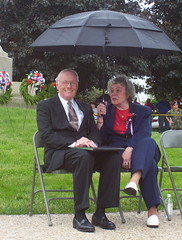Neil Armstrong in Gettysburg

This is astronaut Neil Armstrong in Gettysburg for the Memorial Day ceremonies. In town over the weekend, we discovered that he was going to be speaking. Dr. Armstrong makes few public appearances. He spoke not a word about the moon, but spoke well, saying, among other things, that those who came back from war were not always overjoyed to have survived, having been through what they'd been through and seeing so many friends die. He also said that our responsibility to fallen soldiers was to create a nation of which they could be proud; one where success was neither guaranteed or denied to anyone. He even (I think) tried a passable Hal Holbrook Lincoln accent for his Lincoln passages. In this photo he is looking straight at the camera for us. Before this he gave a little two-fingered wave to Michael and Katie Grace.
I had expected Michael (to whom I have read every moon landing book appropriate for his age group) to be overawed. He was thankful, and happy, but I don't think understands what a rare opportunity this was.
We really had to be creative to get this close. We got there about twenty minutes before the ceremonies, and already a large crowd had formed. There was a very little space at the front as close to the rope as you could get, and I got them down there and knelt down for all the appropriate parts. So I suppose no one got blocked by us.
